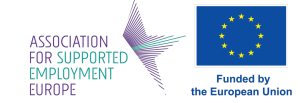From European Union of Supported Employment to Association of Supported Employment Europe.
Celebrating 30 years promoting Supported Employment Across Europe and beyond
ASEE is celebrating a significant landmark – 30 years – (1993 – 2023) in promoting the development of Supported Employment across Europe and beyond. ASEE has played a pivotal role in the promotion and development of employment opportunities for people with disabilities to access and stay in employment.
From an idea discussed around a kitchen table to the leading authority/organisation on Supported Employment with national memberships across 22 European member states, the last 30 years has seen ASEE and Supported Employment grow across Europe and beyond.
From the outset the Supported Employment model was developed to assist people with significant disabilities to access employment in the open labour market. Over 30 years the numbers of professionals and more than 1 million people in the EU have stable workplaces through the approach with supported employment.
ASEE has included people from disadvantaged groups in the strategic goals of Supported Employment defining that Supported Employment is “providing support to people with disabilities or other disadvantaged groups to secure and maintain paid employment in the open labour market”.
Where did it all start?
The European Union of Supported Employment (EUSE) was established in 1993 to facilitate the development of Supported Employment throughout Europe.
The main activities include:
- Campaigning for the rights of people with significant disabilities to access vocational training and employment.
- Organising the biennial conference, training and workshops
- Researching and developing models of good practice, staff training, quality standards, self-advocacy, capacity building and legislation.
- Influencing European social and economic policy.
- Research and knowledge and best practices, information exchange
- Networking with European associations and working with worldwide organisations.
- Developing new national associations – assisting and supporting organisations to establish their own national associations.
Membership – 22 National Association members
ASEE member associations represent over 1.200 service providers that support people with disabilities and people from a disadvantaged situations. ASEE has organised 14 European Conferences attended by more than 7000 delegates, sharing practice and knowledge and expanding the Supported Employment model.
World association of Supported Employment (WASE)
ASEE is a member of WASE.
In 2017 ASEE, in conjunction with the Northern Ireland Union of Supported Employment, hosted the 1st World Conference on Supported Employment, in Belfast, Northern Ireland.
Job Shadow/DUO Day Initiative
This initiative aims at gathering people with disabilities, employers and Supported Employment organisations to raise awareness and highlight the positive contribution disabled people make to the workforce. It started in 2008 and in 2024 representatives from 14 European Member States participate in the initiative including over 6.000 job seekers.
Key Influencer – policy and legislative change
ASEE has been at the forefront of key policy and legislative change e.g. by developing policy recommendations for the EU Study on Supported Employment. Supported Employment is a human rights driven model and in that sense we follow up on the implementation the United Nations Convention on the Rights of Person with Disability, in particular Article 27 in Europe.
National ASEE member associations can assist Governments in the implementation and reporting on Article 27 by promoting and delivering Supported Employment to embed this in the legislation of their country. Other key EU policies that ASEE can influence are:
- EU 2030 Strategy for the Rights of Persons with Disabilities 2021-2030 stating that member countries need to support disabled people into paid jobs in the open labour market.
ASEE and Supported Employment can assist states and government agencies to meet their requirements under these strategic frameworks.
Partnerships
ASEE has developed partnerships with a range of European and global organisations such as the European Association of Service Providers for People with Disabilities (EASPD), European Platform for Rehabilitation (EPR), European Disability Forum (EDF), Canadian Association of Supported Employment (CASE), Association of People Supporting Employment First (APSE), Disability Employment Australia and Supported Employment organisations in China, Africa, Sri Lanka, Brazil etc.
Data Collection and Research
ASEE was involved in the first ever research on Supported Employment commissioned by the European Commission. The research report was launched in March 2012 entitled “Supported Employment for people with disabilities in the EU and EFTA-EEA”. In addition to the research report a “Compendium of Good Practice” was launched.
Projects and reports
Over the last 30 year ASEE has been involved in a number of projects which have addressed key issues and produced reports and guides:-
- EUSE Information and Quality Standards (2005) funded by EU Commission
- EUSE Supported Employment Toolkit (12 position papers and How to Guide on Supported Employment) Funded by EU Commission Leonardo Da Vinci Mobility Programme
- EUSE Toolkit for Diversity – expanding the EUSE Supported Employment Toolkit for people from disadvantaged situation (i.e. young people not in education, employment or training, ex-prisoners and offenders, people recovering from substance abuse) Funded by the EU Commission Transfer of Innovation Programme (link to toolkit)
- Supported Employment Quality Framework (SEQF) Funded by EU Commission ERAMUS+ Programme
- Toolkit for supported self-employment (S²E) Funded by EU Commission ERAMUS+ Programme
EUSE changed its name to ASEE (Association for Supported Employment Europe) in the spring of 2024.
